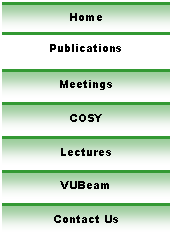
|
Reprint Server |



Computing Validated Solutions of Implicit Differential Equations
Abstract
Ordinary differential equations (ODEs), including high-order implicit equations, describe important problems in mechanical and chemical engineering. However, the use of selfvalidated methods providing rigorous enclosures of the solution has mostly been limited to explicit and weakly nonlinear problems, and no general-purpose algorithm for the validated integration of general ODE initial value problems has been developed. Since most integration techniques for Differential Algebraic Equations (DAEs) are based on transformation to implicit ODEs, the integration of DAE initial value problems has traditionally been restricted to few hand-picked problems from the relatively small class of low-index systems. The recently developed Taylor model method combines high-order differential algebraic descriptions of functional dependencies with intervals for verification. It has proven its power in several applications, including verified integration of ODEs under avoidance of the wrapping effect. Recognizing antiderivation (integration) as a natural operation on Taylor models yields methods that treat DEs within a fully differential algebraic context as implicit equations made of conventional functions and antiderivation. This method has the potential to be applied to highindex DAE problems and allows the computation of guaranteed enclosures of final conditions from large initial regions for large classes of initial value problems. In the framework of this method, a Taylor model represents the highest derivative of the solution function occurring in the DE and all lower derivatives are treated as antiderivatives of this Taylor model. Consequently, one obtains a set of implicit equations involving only the highest derivative. Utilizing methods of verified inversion of functional dependencies described by Taylor models allows the computation of a guaranteed enclosure of the solution in the form of a Taylor model. The performance of the method is illustrated by detailed examples.J. Hoefkens, M. Berz, K. Makino, Advances in Computational Mathematics 19 (2003) 231-253
Download
Click on the icon to download the corresponding file.
![]() Download Adobe PDF version (179086 Bytes).
Download Adobe PDF version (179086 Bytes).
Go Back to the reprint server.
Go Back to the home page.
This page is maintained by Kyoko Makino. Please contact her if there are any problems with it.